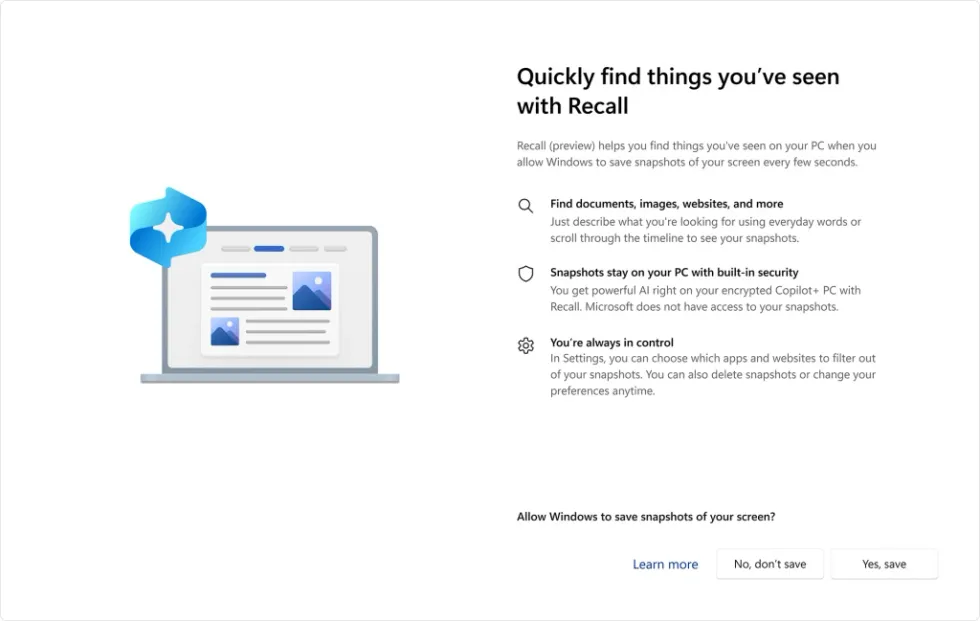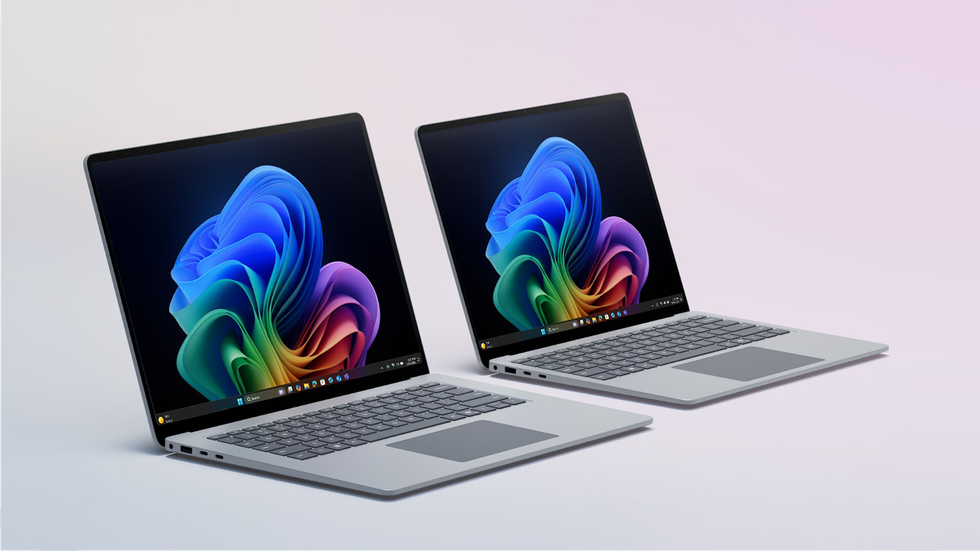Microsoft has promised to make several changes to its upcoming Recall feature following a storm of controversy. It’s only been a few weeks since the Redmond-based company announced Recall as one of a number of exclusive Artificial Intelligence (AI) features coming to new Copilot+ PCs like the Surface Laptop 7 and Samsung Galaxy Book 4 Edge.
But in that time, the UK data protection watchdog has confirmed that it’s “making inquiries” with Microsoftand billionaire SpaceX CEO Elon Musk has warned millions of followers on X to ditch the feature— all of this despite Recall not actually being available on any Windows 11 PCs yet.
Recall is the headline feature of this slate of Copilot+ PCs, which lets you scroll back through everything that has happened on your Windows 11 machine and jump back in time with a click. Everything is searchable as AI has trawled through the images and text on-device
MICROSOFT PRESS OFFICE
Worse still, an ex-Microsoft engineer Kevin Beaumont branded Recall as a “disaster”, warning that “stealing everything you’ve ever typed or viewed on your own Windows PC is now possible with two lines of code.” The security experts published a lengthy blog post criticising the feature last week.
And it seems Microsoft has been listening to the discourse around its standout new AI trick.
“Even before making Recall available to customers, we have heard a clear signal that we can make it easier for people to choose to enable Recall on their Copilot+ PC and improve privacy and security safeguards,” admitted Pavan Davuluri, Corporate Vice President of Windows and Devices, in a new blog post.
“Our team is driven by a relentless desire to empower people through the transformative potential of AI and we see great utility in Recall and the problem it can solve. We also know for people to get the full value out of experiences like Recall, they have to trust it. That’s why we are launching Recall in preview on Copilot+ PCs – to give customers a choice to engage with the feature early, or not, and to give us an opportunity to learn from the types of real world scenarios customers and the Windows community finds most useful.”
The Microsoft executive outlines a number of tweaks to Recall ahead of its launch on June 18, when the first Copilot+ PCs will be available to buy. Recall, and several other AI features coming to Windows 11, won’t be included in a free software update for all users. Instead, users will need to upgrade to Copilot+ certified laptop.
To mitigate concerns around Recall, Microsoft will:
- Disable Recall by default — you’ll now have to manually switch-on the functionality during the set-up process of your Copilot+ PC. This will “give people a clearer choice to opt-in to saving snapshots using Recall,” Pavan Davuluri explains
- Before making any changes to Recall, you’ll need to enrol with Windows Hello using a fingerprint scanner, PIN, or facial recognition on your PC. Not only that but “proof of presence is also required to view your timeline and search in Recall,” Microsoft says.
- Addressing concerns flagged by Kevin Beaumont’s explosive blog post, “just in time” decryption will unlock your database of screenshots when your identity is checked with Windows Hello, “so Recall snapshots will only be decrypted and accessible when the user authenticates”.
- The entire search index database will now be encrypted to keep users’ data safe

Responding to the controversy around Recall, Microsoft will now disable the feature and its “snapshots” by default for all Copilot+ PCs. During the set-up process, the feature will be thoroughly explained to users with the above pop-up, offering them the option to enable Recall
MICROSOFT PRESS OFFICE
Recall works by taking screenshots — or “snapshots” as Microsoft refers to them — of what’s happening on your screen. Microsoft uses on-device AI to transcribe the text from webpages, Word documents, PDFs, handwritten notes, and everything else displayed on-screen on your PC so that everything is instantly searchable.
For example, if you know you were looking at flights to Spain in the last month — you could search for the destination to find the exact webpage. With a single click, Windows 11 will summon the document, picture, video or webpage to pick up where you left off. You can also scroll back in time through the screenshots, which are captured hundreds of times every hour and can be stored for months at a time.
Yusuf Mehdi, Chief Marketing Officer at Microsoft, described Recallas a “photographic memory” for your laptop. Mehdi wrote: “We set out to solve one of the most frustrating problems we encounter daily – finding something we know we have seen before on our PC.
“Today, we must remember what file folder it was stored in, what website it was on, or scroll through hundreds of emails trying to find it. Now with Recall, you can access virtually what you have seen or done on your PC in a way that feels like having photographic memory.”
In the latest company blog post,Pavan Davuluri adds: “You’re always in control of what’s saved as a snapshot. You can disable saving snapshots, pause them temporarily, filter applications and websites from being in snapshots, and delete your snapshots at any time.”
By default, Recall will stop taking snapshots when you’re using a private browsing mode in your web browser, like Incognito Mode in Google Chrome.
 Recall and a number of other AI features will be exclusive to Windows 11 running on so-called Copilot+ PCs, including the newly-announced Surface Laptop 7th Edition, pictured above MICROSOFT PRESS OFFICE
Recall and a number of other AI features will be exclusive to Windows 11 running on so-called Copilot+ PCs, including the newly-announced Surface Laptop 7th Edition, pictured above MICROSOFT PRESS OFFICE
Reassuring Windows 11 users, Pavan Davuluri has pledged to continue listening to feedback from users.
“We will continue to listen to and learn from our customers, including consumers, developers and enterprises, to evolve our experiences in ways that are meaningful to them. We are excited for the upcoming launch of Copilot+ PCs on June 18 and for the innovative new features and benefits this entirely new category of PCs will bring.
“We will continue to build these new capabilities and experiences for our customers by prioritizing privacy, safety and security first. We remain grateful for the vibrant community of customers who continue to share their feedback with us,” the blog post ends.
LATEST DEVELOPMENTS
With the introduction of Copilot+ PCs this month, there will be two distinct types of Windows 11 devices — those with cutting-edge AI features and those with the standard bundle of features available on desktop PC, tablets and laptops that don’t meet the Copilot+ PC certification. The latter is the version of Windows 11 that will be available to Windows 10 users who take advantage of the free upgrade.
Windows 10 will lose support next year, cutting out millions of users from critical bug fixes and new features — unless they pay an annual fee to Microsoft.

